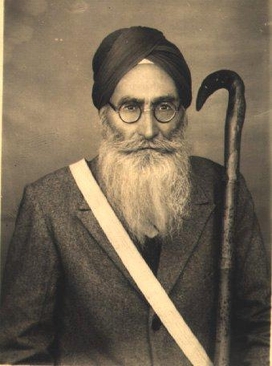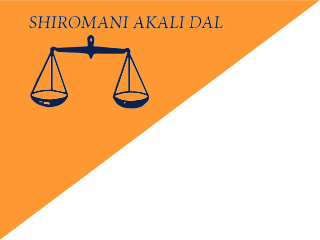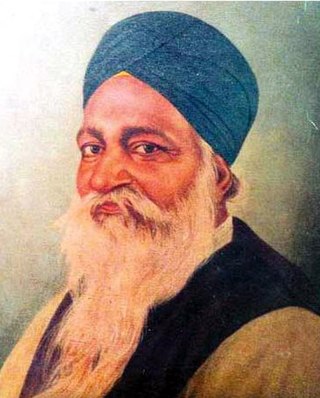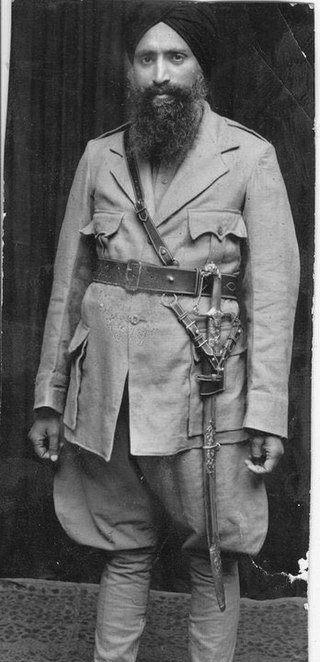The following outline is provides an overview of Sikhism,or Sikhi.

Panth Rattan Shiri Gurcharan Singh Tohra was a president of Shiromani Gurdwara Parbandhak Committee (SGPC),a Sikh body in charge of controlling Gurdwara. He died of a heart attack in New Delhi on 1 April 2004 at the age of 79. He remained the head of the SGPC for a record 27 years,and was one of the most influential and controversial Sikh leaders of the 20th century.

The Punjabi Suba movement was a political movement led by Punjabi-speakers from 1947 to 1966,demanding the creation of an autonomous Punjabi Suba,or Punjabi-speaking state,in the post-independence Indian state of East Punjab. It is regarded as the forerunner of the Khalistan movement.

The Shiromani Gurdwara Parbandhak Committee is an organization in India responsible for the management of gurdwaras,Sikh places of worship,in the states of Punjab and Himachal Pradesh and the union territory of Chandigarh. SGPC also administers Darbar Sahib in Amritsar.

Teja Singh Samundri (1882–1926) was a Sikh religious reformer and one of the founder members of Shiromani Gurdwara Parbandhak Committee and played an important role in the Gurdwara reform movement.

Tara Singh was a Sikh political and religious figure in India in the first half of the 20th century. He was instrumental in organising the Shiromani Gurdwara Prabhandak Committee and guiding the Sikhs during the partition of India,which he strongly opposed.
Sunder Singh Lyallpuri was a leading Sikh member of the Indian independence movement,a general of the Akali Movement,an educationist,and a journalist. Lyallpuri played a key role in the development of the Shiromani Akali Dal and in the Gurdwara Reform Movement of the early 1920s. He was also a founding member of the Central Sikh League. He took part in several roles in the establishment and growth of Indian independence.

The Chief Khalsa Diwan or Chief Khalsa Diwan Charitable Society is a Sikh organisation that is the central organization of various Singh Sabhas spread across Punjab,India. Unlike the Shiromani Gurudwara Prabandhak Committee,the C.K.D. is an apolitical body and only concerns itself with religious,educational and cultural issues. The organization originally controlled Sikh religious and educational concerns and was an advocate of Sikh political rights,though it presently is mostly limited to educational spheres. It was the main council of Sikhs until the birth of more radical organizations,such as the Central Sikh League,the S.G.P.C.,and the Akali Dal.

Teja Singh Akarpuri was an Indian and Sikh politician who served as the 11th Jathedar of Akal Takht from 1921 to 1923 and 1926 to 1930. He was the First MP from Gurdaspur constituency In Lok Sabha from 1952 to 1957 and was succeeded by Diwan Chand Sharma.

Amrik Singh was the President of the All India Sikh Students Federation. He was killed in the Indian Army's operation on the Golden Temple on June 6,1984.

The Delhi Sikh Gurdwara Management Committee (DSGMC) is organization in India responsible for the management of Gurdwaras, Sikh places of worship in the City of Delhi. It also manages various educational institutions,hospitals,old age homes,libraries and other charitable institutions in Delhi. It is headquartered in Gurdwara Rakab Ganj Sahib,near Parliament House. Currently,the president of DSGMC is Harmeet Singh Kalka.
Governor Ujjal Singh was an Indian politician who was a participant in the First Round Table Conference,opened officially by King George V on 12 November 1930. Ujjal Singh served as the Finance Minister of Punjab,Governor of Punjab,followed by acting Governor of Tamil Nadu. Prior to this he was one of Pre-Partition Punjab's largest landowners,owning thousands of acres in Hadali,Jaranwala,Mian Channu,Lyallpur,Montgomery,Sargodha and other areas.

Sant Fateh Singh was an Indian Sikh religious and political leader,and a key figure in the Punjabi Suba movement.

The Akali movement,also called the Gurdwara Reform Movement,was a campaign to bring reform in the gurdwaras in India during the early 1920s. The movement led to the introduction of the Sikh Gurdwara Bill in 1925,which placed all the historical Sikh shrines in India under the control of Shiromani Gurdwara Parbandhak Committee (SGPC).

Kartar Singh Jhabbar was a Sikh leader known for his role in the Gurdwara Reform Movement of the 1920s. He is remembered for his campaign that successfully led to the to establishment of the Shiromani Gurdwara Parbandhak Committee in 1920. Jhabbar was a toponym used as his alias.

Baba Kharak Singh was an Indian playwright born at Sialkot in British India. He was involved in the Indian independence movement and was president of the Central Sikh League. He was also one of the founders of the Shiromani Gurdwara Parbandhak Committee.

The Shiromani Akali Dal (SAD) is a centre-right Sikh-centric state political party in Punjab,India. The party is the second-oldest in India,after Congress,being founded in 1920. Although there are many parties with the description Akali Dal,the party that is recognized as "Shiromani Akali Dal" by the Election Commission of India is the one led by Sukhbir Singh Badal. The party has a moderate Punjabi agenda. On 26 September 2020,it left the National Democratic Alliance over the farm bills.

The Jathedar of the Akal Takht is the head of the Akal Takht and head of the Sikhs worldwide. The jathedar has the de facto power as the supreme spokesperson of the Khalsa to summon,trial and sentence any person who identifies as a Sikh from the Akal Takht.

Udham Singh Nagoke was a freedom fighter,Jathedar of Akal Takht and member of Rajya Sabha.

Ishar Singh Majhail (1901-1977) was an Indian politician and legislator from Punjab.

















